By Ed Leahy
Ireland face USA tonight in Dublin and much of the discussion since Friday's defeat to Scotland has focused on the Irish assistant manager rather than the result and the reasons for it.
Martin O’Neill remained upbeat in the aftermath of that loss in Glasgow, suggesting that seven points was a good return from the first series of matches going into the New Year.
The Ireland manager was also accentuating the positives, outlining the run of home games that would work in the team’s favour in their quest to secure automatic qualification for EURO 2016.
In fact, O’Neill claimed that it would have been a fair outcome had Ireland grabbed a late equaliser in the final moments when Grant Hanley’s header cannoned back off the bar.
Those comments came in the immediate aftermath of the game, but having had the weekend to digest the defeat, and on second, and perhaps third viewing, you would imagine that O’Neill must really be disappointed with how things transpired in Glasgow.
Had Ireland grabbed that late equaliser, it would have certainly confirmed O’Neill’s emerging status as a lucky manager, having got out of jail in Tbilisi with a late winner before pilfering a point at the home of the world champions.
But Ireland got exactly what they deserved in Glasgow and can take only one positive out of a bad night at the office, with the goal difference suffering the least possible damage on a night when the manager was out-smarted and his team out-played.
While the clash of the Celtic cousins was rightly billed as a derby encounter, there was no doubt, and so it proved, that it would be a blood and thunder encounter.
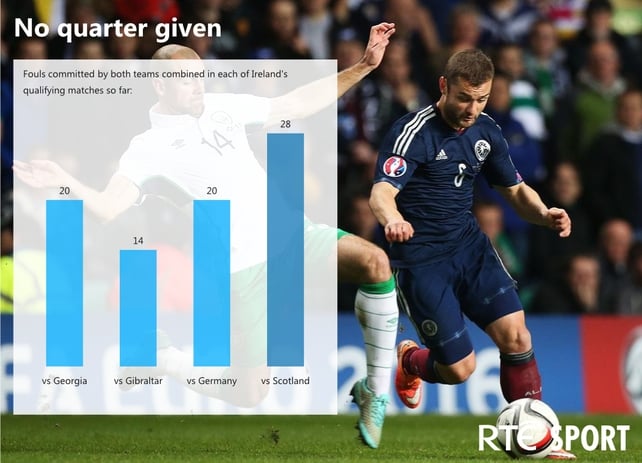
But it was also, intriguingly, the face-off of two consecutive Celtic managers, claimed to be cut from the same cloth, back in their former place of employment in the east end of Glasgow.
As with all encounters, there will be some fortuitous scenarios and on this occasion it was Scotland manager Strachan who would get the roll of the dice, which O’Neill was afforded in the aforementioned qualifiers.
Before a ball was kicked, Strachan had to reshuffle his pack as James Morrison was ruled out through illness, thus throwing Charlie Mulgrew into the midfield alongside Celtic team-mate Scott Brown.
Mulgrew would provide a much more defensive option than the attack-minded Morrison and it proved a masterstroke as the Celtic man would go on to dominate an inexperienced Ireland midfield with a man of the match performance.
Strachan’s side also proved very fortunate to finish the first half with eleven men as centre-half Hanley could have received one, if not two, red cards.
Even the most lenient of officials would have brandished two yellows to the no-nonsense defender who was caught in possession as he hacked down Shane Long, before launching himself, elbow first, into David Forde from a set-piece as his forearm smash connected with the Ireland keeper’s face.
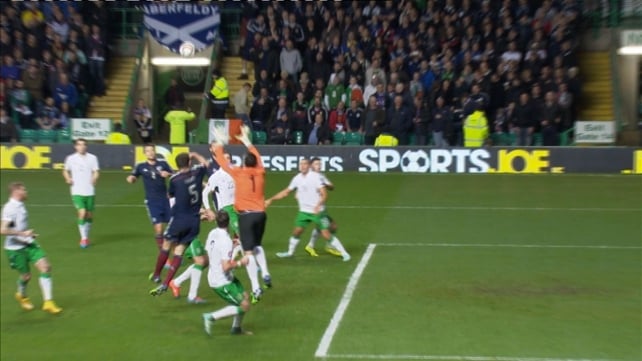
The winning strike also had an element of good luck to it as the referee had initially given a goal kick before awarding the corner that led to the goal.
But every other aspect of the victory was a result of Strachan’s ever-evolving role as Scotland manager, as his side continue their renaissance under his passionate stewardship.
Both managers had planned for an old-school, Old Firm-esque derby encounter with the game being played at breakneck pace with the emphasis on physicality rather than aesthetics.
But the story of this fixture would become clear within two minutes, as game-plans were revealed and deciding factors were beginning to take shape.
O’Neill went with an adventurous formation, starting Jon Walters alongside Shane Long in attack.
But if the formation was adventurous, the tactics were of a previous era.
The manager’s two-up approach came with the return of the much-maligned long-ball game.
The Ireland midfield was immediately bypassed as the usually attack-minded Seamus Coleman launched it 50 yards at Long, before John O’Shea followed with a similar ball aimed at Walters less than 60 seconds later.
And perhaps in a game of such high intensity, pumping it long was not a bad occasional option as it can put the opposition on the back foot and cause chaos, which it did on both occasions as Long won a free-kick in a dangerous position, while Walters tested the keeper, albeit a tame enough effort.
But there was nothing occasional about Ireland’s route-one football. It appeared to be the only option?
Scotland didn’t take long to notice this archaic Ireland game plan and within minutes were expecting the long delivery from the Irish half, and they started to deal with it comfortably, with Walters and Long getting frustrated at a very early stage in the game.
Scotland on the other hand took an entirely different approach, again becoming evident inside the opening exchanges.
Strachan’s men worked hard to get possession before stringing a few passes together around the half-way line ahead of bringing the many creative options into play.
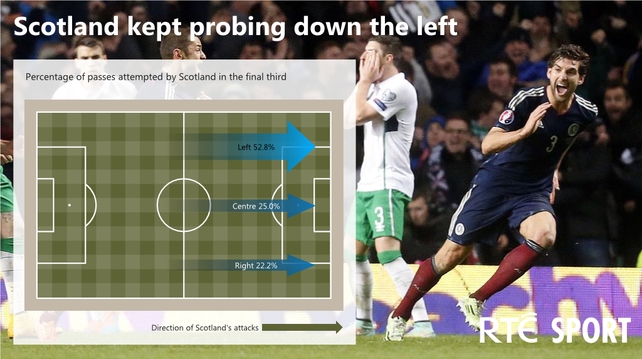
The early threat came down Scotland’s left flank as the relatively inexperienced duo of Ikechi Anya and Andrew Robertson were given free rein to express themselves and attack the Irish right side.
Strachan’s belief in his players was quite obvious as the experienced attacking force of Coleman and Aiden McGeady - who also enjoy the benefit of playing together at club level - spent the entire first 45 minutes tracking back as the Scottish left-back and winger caused all sorts of problems, with some fine deliveries arriving into the penalty area.
The midfield battle should have been a traditional two on two but it was a mismatch as Scott Brown and Mulgrew dictated the play with Ireland’s Darron Gibson and Jeff Hendrick chasing shadows as the ball was won quickly and sprayed to either flank.
The Irish pair sat deep, and tried to cover the aforementioned duo as well as keeping one eye on the lively Steven Naismith and right-sided midfielder Shaun Maloney who were also operating in the space with Ireland’s unable to deal with the movement and precise passing.
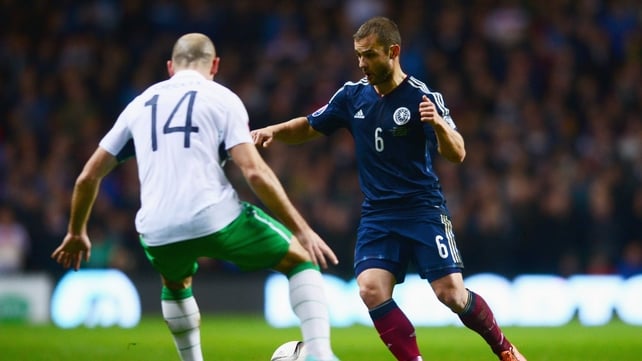
Even Steven Fletcher was dropping off the two centre-halves to link up the midfield with the many attacks marauding down the left wing.
There was little O’Neill could do at that stage, the game was in full swing and he had picked the wrong midfield partnership. Stephen Quinn and David Meyler would surely have been a better combative option than the not-fully-fit Gibson paired with the inexperienced and attack-minded Hendrick.
McGeady was booked early on, with the boo boys having their desired effect on the Irish midfielder, who was working hard but initially had no influence as he spent the first half tracking back.
James McClean on the other wing was equally ineffective and was not following Maloney inside who was making very clever runs between the defenders, while right back Steven Whittaker was even getting forward to get in on the action.
Luckily for Ireland, the defence were holding firm, while the Scottish possession and chances created were not taken.
Such was the work-rate of the Scots inside the Ireland half that the long-ball game was also effectively neutralised as accurate balls could not be launched by the under-pressure Irish players.
Ireland’s only other apparent tactic was to use their throw-ins to work the ball down the touchline like a schoolboy team trying to get into the opponents’ half. The interval couldn’t come quick enough.
How Ireland had kept it scoreless was anyone’s guess. Perhaps O’Neill was that lucky manager?
Lucky or not, to his credit, O’Neill sent out the same eleven but with a different approach in the second half.
Walters dropped a bit deeper into midfield to keep an eye on Naismith and while leaving Long isolated up front, it had the desired effect in the middle of the park.
Gibson finally found some room and Coleman and McGeady were, at last, going forward.
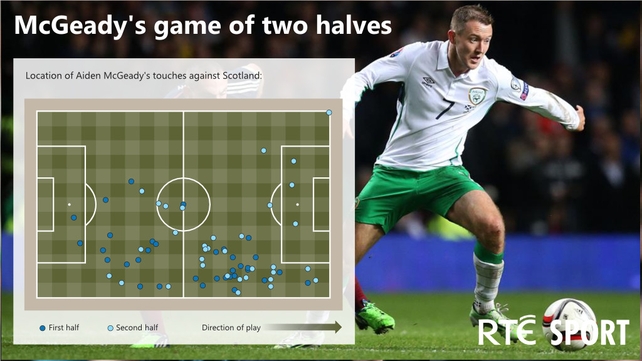
But again Mulgrew stepped in to put his foot on the game, while Robertson and Anya were not letting up with the left-flank pressure.
Ireland matched the Scots for the first 15 minutes of the second half, but gradually the home side took control.
Again Scotland spread the play with the pace of the left flank complemented by the trickery and precision coming from Naismith and Maloney on the right. Substitute Chris Martin was inches from giving the home side the lead and O’Neill must have sensed the danger as both Gibson and Long were replaced by Quinn and Robbie Brady.
Ireland appeared to have lost any shape they had in the second half with basic defending now looking like a chore as Keogh and Coleman looked unsure under a routine high ball.
Another Scotland attack and a needless push from the ineffective Hendrick gave away the free-kick that would lead to the goal.
Ireland had a similar free back in the first minute of the game and on that occasion McClean’s delivery was awful, failing to get past the wall, which became another pattern of Ireland’s play as their set-pieces were let down by the poor quality ball.
But Mulgrew had not put a foot wrong and continued by whipping a left-footed free into the edge of the six-yard box, where the back-peddling Walters could only edge it on to his own crossbar.
The short corner was taken and while the Ireland players appeared to be unsure of their positions for such a scenario, the Scots brought the training ground routine to the arena and it worked a treat.
Ireland were asleep, but the composure and the quality of the strike from Maloney were worthy to win any match and Scotland got the lead and the victory that they more than deserved.
There was still plenty of time for Ireland to grab a late equaliser. And it almost arrived deep into injury time as Hanley’s header crashed off the bar.
An equaliser would have put Ireland in a superb position going into the next round of games in March but it would also have papered over a lot of cracks as the relatively new Ireland manager still tries to work out his best team and preferred formation.
A home win over table-toppers Poland at the Aviva in March will bring Ireland back into automatic contention. Anything else will leave O’Neill and the Irish with an uphill struggle in their quest to reach the final in France.

